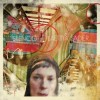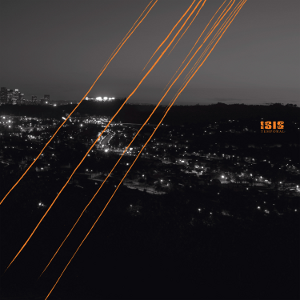 It’s mandatory when reviewing [post=laetitia-sadier-interview text=”Laetitia Sadier“] to glibly remark on how everything she does sounds a bit the same, so let’s get that bit over to start with. Silencio isn’t sonically a million miles away from 2010’s The Trip, or indeed most Stereolab or Monade releases if it comes to that. The familiar elements are present: retro-futurist electronica, lushly arranged textures, “exotic” rhythms, sophisticated melodies and of course that curiously detached yet intimate and airy voice, floating like a liberated red balloon over the rooftops of her intricately-constructed universe. In truth, she has developed a musical language over the past twenty years that is quite at odds with the familiar vocabulary of rock ‘n’ roll. As a result, she always sounds more like herself than anyone else, a trait that can often disguise the breadth of her music.
It’s mandatory when reviewing [post=laetitia-sadier-interview text=”Laetitia Sadier“] to glibly remark on how everything she does sounds a bit the same, so let’s get that bit over to start with. Silencio isn’t sonically a million miles away from 2010’s The Trip, or indeed most Stereolab or Monade releases if it comes to that. The familiar elements are present: retro-futurist electronica, lushly arranged textures, “exotic” rhythms, sophisticated melodies and of course that curiously detached yet intimate and airy voice, floating like a liberated red balloon over the rooftops of her intricately-constructed universe. In truth, she has developed a musical language over the past twenty years that is quite at odds with the familiar vocabulary of rock ‘n’ roll. As a result, she always sounds more like herself than anyone else, a trait that can often disguise the breadth of her music.
Over a bed of melancholic strings and choir, opener “The Rule of the Game” holds up Jean Renoir’s 1939 class satire La Règle du Jeu as a mirror to contemporary society:
The ruling class neglects again responsibility
over-indulged children drawn to cruel games
pointless pleasures, impulsive reflexes, a group of assassins.
By the splendidly titled “Auscultation to the Nation”, we are fully reacquainted with the unique alchemy of that voice – its ability to suffuse the driest manifesto with warm sensuality. The jaunty up-tempo number could almost pass for a John Barry film theme had the words not been borrowed from a listener’s rant on a French radio phone-in:
Rating agencies, financial markets and the G20
but who are these people?
and why on earth do we care about their opinion?
What do we care about their self-proclaimed authorities?
…oh, and of course the thrilling noise collage that closes the number.
Laetitia recently told an MTV interviewer “I’ve always wanted to challenge the system and the lies that we’re being told.” For the past two decades she has routinely challenged the quaint notion of political music being the domain of shouty rock blokes and has shown that radical ideas are more effectively delivered in a calm and considered manner than via the hysterical testosterone chest-beating of ‘rock’ music. When required, Stereolab could certainly rock, but they were never ‘Rock’. Those of us who found Paul Weller a tad underachieving could take heart that here was a groop that actually spent two weeks in the UK hit parade with a song that started:
It’s alright because the historical pattern has shown / how the economical cycle tends to revolve / in a round of decades three stages stand out in a loop / a slump and war then peel back to square one and back for more
(“Ping Pong” – 1994)
Not all of Silencio is political however, and “Silent Spot” returns to The Trip’s meditations on Laetitia’s sister’s recent suicide, two years on taking perhaps a more positive outlook as she poignantly reflects:
She was ready, chose to go,
Had done it all, that met her strength
The silence of the album title manifests itself in loss on several occasions, with both “Find Me the Pulse of the Universe” and “Moi sans Zach” alluding to personal loss of some kind, but this is not a maudlin record by any means, both songs breezing along on carefree Latin grooves. The arrangements and instrumental detail throughout are a delight, with twangy guitar rubbing up against analogue bleeps, double bass against choir, without ever getting too fussy. The album was mostly recorded in two sessions – in Toulouse and Chicago – each featuring a completely different set of musicians.
“Next Time You See Me” was co-written with erstwhile partner Tim Gane and although Gane doesn’t seem to play on the track, its propulsive groove and breezy ba-ba-ba vocals would happily sit on a Stereolab record. The Zincs’ singer James Elkington contributes “There’s a Price to Pay for Freedom (And It Isn’t Security)” and “Fragment pour le future de l’homme”, both of which slip seamlessly into the flow. Two oddities don’t originate from these sessions and feature Laetitia alone. “Merci de m’avoir donné la vie”, recorded “at home and on the road” sounds as if iPad apps were heavily involved, although there are no instrumental credits on this one. In fact, Moog iPad apps seem to provide quite a bit of the sonic colour throughout Silencio, possibly to the horror of old school analogue-fetishist Stereolab fans!For the final track, “Invitation au Silence”, Laetitia takes us on a field trip to St Blaise church in the south west of France to explain simultaneously in French (spoken) and English (whispered) the effect silence has on her before offering us “an invitation to sample some silence in this St. Blaise church… Listen. Listen how resonant with truth silence is.” Of course, as any Cage scholar knows, it’s not silence at all and the album closes with two minutes of the murmur of traffic, wind and distant voices reverberating around the church.
Where The Trip was a relatively subdued début, from the austere black and white cover to a relatively brief playing time that included three cover versions. Silencio is more expansive, from the more ornate cover artwork to the more generous length, varied moods and broad subject matter. Perversely, if you challenged people to match the two titles to the album covers and music within, I’m sure very few would get the right combination.
“Silencio” is one of the very best records of the year so far and even one of the best of Laetitia’s career. Strangely enough, it even serves to boost the standing of The Trip in that what seemed at the time like a slightly restrictive change in direction is revealed as a satisfying glimpse into another side of one of our more fascinating and vital artists.
-Alan Holmes-




One thought on “Laetitia Sadier – Silencio”
oh… another review:
http://t.co/4mfEehk0